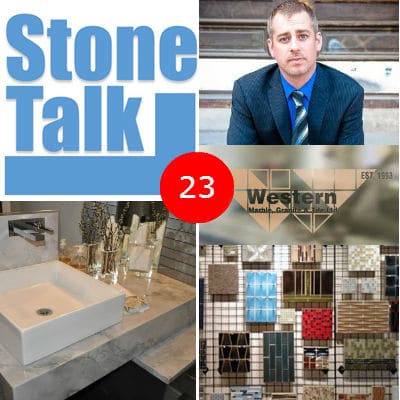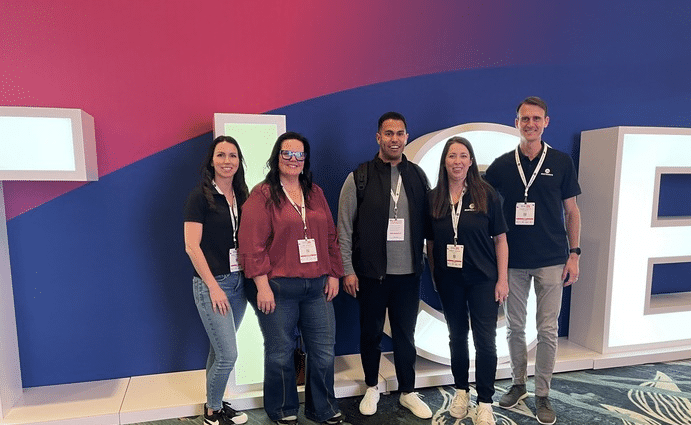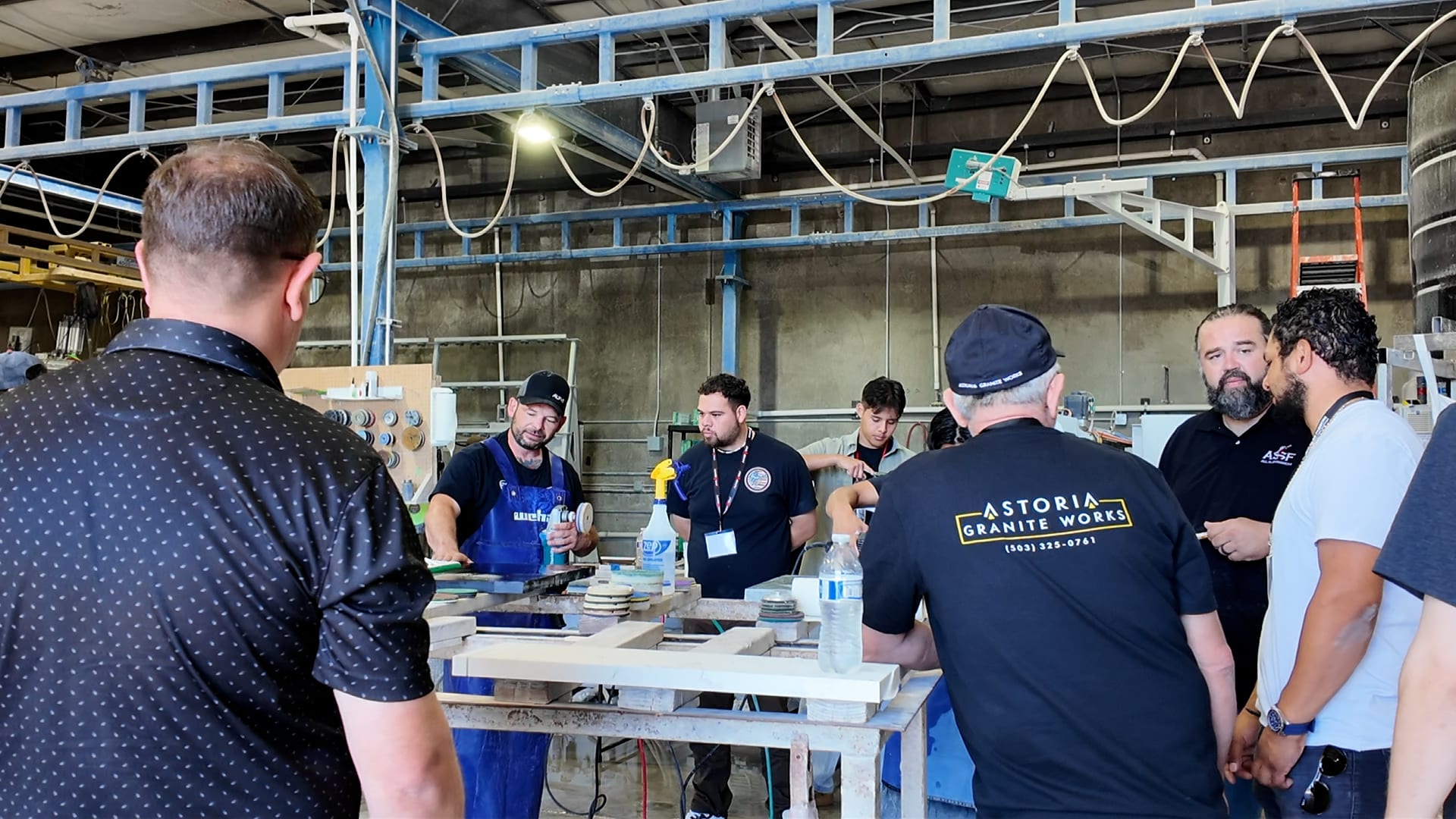In Episode 23, Patrick speaks with Jeremy Mathison, CEO of Western Marble & Tile Ltd.

Listen to this episode to learn:
- How radio can still be a great marketing tool
- How social media can cause problems
- The importance of team pride in workmanship
- How sourcing sinks and faucets from Asia keeps costs down
- How automating your shop can increase your capacity and increase revenue
Be sure to subscribe to the podcast in iTunes… and please let us know what you think! You can leave comments for this show on the StoneTalk Facebook page or on this site.
If you have stories or insights that you’d like to share with other fabricators, please reach out to Patrick.
Transcript
Patrick: Welcome to StoneTalk, the podcast for countertop fabricators. Brought to you by Moraware, makers of JobTracker scheduling software and CounterGo estimating software for countertop fabricators. I am your host, Patrick Foley. Today I’m chatting with Jeremy Mathison, CEO of Western Marble Granite & Tile in Winnipeg. Let’s give him a call.
Jeremy: Hello, Jeremy speaking.
Patrick: Hey, Jeremy. It’s Patrick from Moraware. How are you?
Jeremy: Very good Patrick. Yourself?
Patrick: Good. Let’s start with the basics. How big is Western Marble & Tile? Either kitchens, revenue, employees. Whatever makes sense to you?
Jeremy: Well, in revenue we vary year to year, between four and six and a half million. We should finish around 7,000,000 this year.
Patrick: So a pretty good size business. Are you one of the biggest ones in…?
Jeremy: We are the biggest one, yeah.
Patrick: Okay. Yeah, we kind of figured that. Nice. How did the company get into business or how did you get involved?
Jeremy: The company was originated in 1977 and it started off as a tile supply warehouse, and then from there in 1984 I think it was. In 1985, the former owner brought granite into the industry. So he was one of the founders of granite in Manitoba, a great thing. In 2012, he didn’t have a very large company. It was pretty stagnant I would say. And [inaudible 00:01:53] 2013, he wanted to retire, so I decided to buy it. I had been looking at different options of different companies that I wanted to do because I originally owned factories in China. So I was constantly traveling back and forth between Canada home and Asia, spending six months, a year in Asia. Wife, child, that all changes. So selling all my stuff in China and I bought Western.
Patrick: Wow. Did you have an experience with granite or was…?
Jeremy: Furniture and I had dealt with a lot of vanities. In 2013, I don’t know how to sum it up the easiest way. In 2013 the revenue was about 1.6 million. Within a year, I had it at 4… no, sorry, 3.2. Doubled it and then I grew it another 25%, 40%. A lot of our savings come because of my advantages of purchasing in Asia.
Patrick: Okay, so that was one of my questions. Do you get a lot of your material in China then?
Jeremy: Not the stone, no. I don’t buy stone out of China, but I buy the zincs deposits. I have eight companies. Well, Perry [SP] met them all at the last Inventory Rack for Park [SP]. He met them, they all want the same thing because they’re paying 15, 20 times more than I am. Yeah, it’s pretty crazy.
Patrick: Yeah, that’s very interesting. I would have thought the stone first, but I guess that makes sense that by getting cheaper at six…
Jeremy: I don’t trust the stone. I don’t trust it, not yet. And I’ve got 15 years experience in China. I used to be fluent in Mandarin. I’d say maybe 40% now, 50%.
Patrick: So what else did you do to get such an increase in revenue? How did you drum up your business?
Jeremy: We went completely automated. We went from a complete hand fabrication shop, where they had a designated grinder with three grinders to lop, not just an open empty spot, not just a fabrication area. We went completely pneumatic, there are electric everything.
Patrick: And digital? You mentioned Park, going Park.
Jeremy: Yeah, we went completely digital. Yes, everything was Park. We kept everything with Park, and we will keep everything going forward with Park. It’s a fantastic company.
Patrick: Awesome. So that allowed you to be more efficient, but then you had to go get new business too. Did you increase your marketing or add new sales people?
Jeremy: Yes. I’m a firm believer in 30% of your revenue should be spent on marketing. Yeah. If people don’t know you then they can’t find you. And, in a city of 800,000, we have 18 shops. Granted, take 60% to 70% of those and make them backyard shops but they still are. They’re still around, they’re still taking that $8,000, $9,000 per job away.
Patrick: Yeah. You’re spending 30% of your revenue on marketing. Are certain things more effective…?
Jeremy: Maybe not that much anymore.
Patrick: Okay. But what turned out to be effective? What was the most useful kind of marketing?
Jeremy: Radio.
Patrick: Really?
Jeremy: Yeah, we get a lot of in… like a lot of traffic from radio.
Patrick: That’s interesting and do you think that’s unique to your market or do you think that’s underused all over?
Jeremy: I would actually… my next step is television.
Patrick: Really?
Jeremy: Because everybody likes to see visual.
Patrick: Yeah, that’s true.
Jeremy: Radio and our work and our lines of field, so like yourself included we work with pieces of art. So it’s very visual. So I’m not sure the audio end of it is doing what it should anymore. There is going to be a significant cost increase, but it may be worth it.
Patrick: Yeah, I’ve heard that you can get some… If you don’t care when it airs, when it shows up that you can get clearance time on TV. That there is, you can get some good…
Jeremy: Oh, I’d want news, the news hour.
Patrick: Really?
Jeremy: When the family is sitting together, eating dinner, watching the news.
Patrick: You don’t want the cheap stuff then, you want that.
Jeremy: No. You can’t. If you do cheap, that’s what your result will be.
Patrick: Wow, I’m glad I asked. That’s awesome. And I noticed you have a really nice website as well, so it looks like you invested in that. Your website references several different social media sites. How important is your online presence and which part of it is more important, the website or your Facebook page? How does that help?
Jeremy: Will this be on the podcast?
Patrick: Is it a secret? You don’t want to tell people?
Jeremy: No, it’s not a secret. It’s just a personal opinion towards social media. I despise it. For a business it’s good, but I’m not impressed. They let any Yahoo say anything they want and allow. I had to deal with a social media nightmare about three weeks ago.
Patrick: Really?
Jeremy: Yeah, it was absolutely beyond ridiculous. And I handled myself accordingly, but this customer chose not to. What we ended up doing, if you have time for the story.
Patrick: Yeah.
Jeremy: This particular instance was, we rejected material that was of not quality that we would put in our own homes. The customer was informed of this, so we had to re-order material. There was only two places in North America that actually supplied this specific material Coldspring and Stone Holdings. Stone Holdings material we got unfortunately just didn’t work, so we sent it back. The customer thanked us. Thanked our operations manager for catching that and so on. She was communicated with multiple times and told okay, the new material will be on its way and then we have to wait XYZ. And we couldn’t give her an installation date as, I hope, no fabricator out there does. Until you have the material in your hands, you can’t say, “You know what? I’ll be there June 14th.” You can’t give a definitive date. I don’t like to do that because why disappoint? Educate and keep them on even… well, not even keel. It’s wrong.
Patrick: So she threw a fit on Facebook or something or?
Jeremy: Yeah, with Facebook. Everyone, every single one. This customer took it to an extreme level and all I said… I tried contacting her by phone three times, two to three email, which she claimed she never received, but it’s funny in her reply email to the different subject heading, a new email chain. She answered the questions of the last email and then claimed she didn’t read it. My point to social media is if somebody can absolutely go on a tear, when the company has to act in a certain way and can’t lay out all the facts and do this and do that.
Patrick: First of all, did you ever install countertops for her or did the…?
Jeremy: No.
Patrick: So didn’t really install..
Jeremy: I refunded her money and had her sink and the refund couriered back to her, to which to this day… I can’t say to this day, because she’s blocked all of us. So I can’t see anything that she says and any time I see somebody on Facebook I’m like, “Hey, check this page for me.” Because I just want to see. I had to go to the police, to my lawyer because it was ridiculous. She ended up making fun of someone even after she was told that this person had a learning disability, dyslexia. It’s not that big of a deal. He spelled words wrong. Okay.
Patrick: Let’s step back a little bit. So no matter what, you can’t make all customers happy, right?
Jeremy: Exactly.
Patrick: So social media just makes the ones who are unhappy, it just gives them a bigger forum for…
Jeremy: A bigger forum, exactly.
Patrick: On the flip-side, I’ve talked to some customers who’ve gotten really good for the 99% of customer you do make happy you get them to say something nice to you on Facebook. Or you get them to give you a nice review on Google reviews or something around house, and then at least if I’m a customer in your market and I see, “Well, one guy threw a hissy fit, but these other 45 people loved them.” I’m not going to worry about that.
Jeremy: Yeah, that’s right. But then you try and get people to do that in a subtle way that you’re not asking them to boast for you online. We get the emails from people all the time, they fill all the in-house survey, but I can’t post those all to Facebook. I can’t. You know what I mean? I can’t put my internal procedures on….
Patrick: You can’t do that, but you…
Jeremy: Social media….
Patrick: But you could ask them, say, “Hey, if you like us, tell your friends.”
Jeremy: Yeah, that’s right. That’s a good point.
Patrick: When I’m happy with someone’s service, I want to tell everybody, and I want to feel good about it. So just even the simple fact of having a Facebook page, then if I’m proud of my new kitchen countertops. I’ll just go on Facebook and say, “Hey,” show a picture, “look at my great new countertop. Thanks, Western Marble and Granite.” That sort of thing. Even that little bit at least helps drown out some of the bad noise.
Jeremy: Yeah. It turns into a 24-hour job.
Patrick: That’s the other part and the interesting thing is until you mentioned that, I was thinking it was optional. But the funny thing is because of the fact that anyone can throw a tirade at anytime, it’s becoming less and less optional. Thirty years ago, of course, you needed a listing in the Yellow Pages. It wasn’t going to get you a ton of business, but it was something you had to do, right?
Jeremy: Exactly.
Patrick: Fifteen years ago you needed a web page. It wasn’t going to give you a lot of business, but it was just something you had to do. It almost seems like it’s becoming more and more today, that you need to do something. Hopefully not a full-time job, but someone needs to be making sure that people aren’t talking trash about you by emphasizing. The only effective way to do that is by making sure they’re talking good things about you too.
Jeremy: I understand we’re a large company, but the one thing I will say about our team is the pride of workmanship. They pride themselves daily as we are fabricators, we’re not just manufacturers. If you would see the dynamics you’d understand more. If a piece needs to be touched up in any shape or form after it comes out the machine, they’re doing it. It’s not going out with their name on it and it be that way. The pride is there.
Patrick: So 99% of your customers are happy. Is that what makes your customers most happy or is it a different part of the process? You sound like you actually communicate.
Jeremy: I think it’s the entire process.
Patrick: You communicate pretty well it sounds like.
Jeremy: Thank you, that’s right. Because the company is so old and it did have an owner that didn’t care or had given up. You know what I mean?
Patrick: Sure. It wasn’t on a growth track.
Jeremy: Yeah, it was not. It was seriously on a decline. From then till now is my goodness amazing difference. It’s a 180. It turned right around back in the right direction. And they work together as a team. I think that’s the only way I know how to do things and say, “I need you to do this and you get it done,” and they do. I rarely have issues with that. But our process somehow was the forward card work, templates and hand grinding and pencil, grease pencils to now being taking pictures, cutting things with a water jet. Throwing it on a CNC, touching it up at the end. Budding [SP] it up, making sure it all fits, sending it out the door. They went from 15 to 20 kitchens a week to that’s by Tuesday at noon. Yeah.
Patrick: So let me go in a slightly different direction, you mentioned you have a bunch of competitors there. How do you determine your prices? Do you compete on price at all or have you established enough that you don’t even worry about the competitors? You’re basing your price on something else? What do you think about when you’re setting prices?
Jeremy: We base the price to a specific margin. If we lose it to a small one, it’s surprising and not surprising how many times did we get called to go fix somebody else’s screw up. And it happens quite often.
Patrick: And how are you able to put that reality into your marketing and prices in the first place? Again, if I’m a customer deciding between the fly-by-night place who’s going to need the repair. How do you address that so that they come to you in the first place? That’s a hard question by the way.
Jeremy: Yeah, it is very difficult to… I’m trying to think we go on, well…
Patrick: I normally ask softballs, but the pricing is one that… We’ve been talking about pricing a lot on our side lately and we think there is no more important topic for fabricators to think about than pricing. Because chances are…
Jeremy: Well, we won’t race to the bottom, that’s for darn sure. We will take a big box store here and there, we have one which is very busy. It’s a little bigger of a project, we’ll say.
Patrick: I think addressed it. By saying you’re not racing to the bottom, then you’re looking for something else that makes customers happy. It sounds like you try to communicate with customers, let them know that… for example, when you said you won’t give someone an installation date if the granite isn’t in the building, that’s a commitment that’s… You said you want to set expectations and not meet them, so if you can’t give a date there is uncomfortable conversation where you have to say, “Hey, I’m sorry but I can’t give you a date right now.”
Jeremy: And the last one didn’t turn out so well.
Patrick: The example, that particular example or even the fact that as you said. First of all, where does most of your business come from? Do you get mostly retail walk-in business or do you have repeat…?
Jeremy: No, no. I would say a lot of accounts, a lot of builders. Most builders in the city.
Patrick: So if it’s repeat business, they’ve come to trust you then?
Jeremy: Oh, of course. And we have a service guy, we have everything. They’re taken care of 100%. We actually get quite the compliments that specific part of it, how well we deal with the things. I only can go with what people say on how we’re exceeding or meeting expectations of the company. I don’t even know how to answer that to be honest.
Patrick: Well, that’s fair. Again, as I said, that one is not an easy question but it’s one I’m going to start asking all the fabricators I talk to. Because the abstract question there is if you raised you raised your prices 10% today…
Jeremy: Would people stick around?
Patrick: Yeah.
Jeremy: No.
Patrick: You don’t think so?
Jeremy: No.
Patrick: Why not?
Jeremy: Because I live in a very unique pricing city. The cost is…
Patrick: Sure. But then turning that another way. If you raised your prices 10% today, what would you have to do to attempt to keep customers? So without raising your prices, can you do that today?
Jeremy: That’s already been done because of the U.S. dollar, the conversion of the Canadian to the U.S. dollar and that basically fluctuates. But, unfortunately, sometimes when the dollar goes back to normal the pricing doesn’t change.
Patrick: Yeah, fair enough. Well, let me end with an easy one then since I asked you a hard question.
Jeremy: I appreciate it.
Patrick: Of all your new equipment in your shop, what do you think is the most useful? The one you couldn’t live without of all your new digital equipment, can you name one piece of equipment that oh, our biggest… If I were going to get one first, if I could only have one of these and everyone else had to be manual, which is your most useful piece of equipment in the shop?
Jeremy: CNC.
Patrick: Do you keep it utilized all the time or is it under-utilized?
Jeremy: It runs 18 hours a day.
Patrick: Wow. When do you get to the point where you think, “Oh, man, we’re going to have to invest in another one,” or do you think you’ll ever get to that point?
Jeremy: I was there about three months ago.
Patrick: Okay, nice. And are you getting another one or just toughing it?
Jeremy: Yes, it’s in the works. Yeah.
Patrick: Well, there you go. Okay, cool.
Jeremy: Eventually, we’ll eliminate competition.
Patrick: Yeah, yeah. Makes it even harder.
Jeremy: Makes it harder for them to keep up with us, and then I invested in a building and stuff already. So there is some other avenues in the works. It’s not in the immediate future but in the near.
Patrick: You invested in a new building, so you’re going to be moving?
Jeremy: It’s possible, yeah. It’s possible. We’ll see. We could also just keep it as an investment.
Patrick: All right. Yeah, always a good thing. Parting thoughts. What’s keeping you up at night today? What’s the biggest challenge that you don’t yet know how to fix that you’d like to work on?
Jeremy: It’s the old saying of constructions, “Hurry up and wait.” That drives me nuts. People have deadlines and they expect very strict deadlines, and then they end up not being ready. Where we bust our butts to be ready for them and then they aren’t. And don’t get me wrong, it happens vice-versa as well. But when it happens on our end, we get, “Well, what the hell? What’s going on? This is crazy. This is horrible. Why aren’t you doing this?” And when they do it, it’s “Hey, just come back next week.” So let’s completely re-arrange our next week, because we’re booked six to eight weeks in advance and it just throws wrenches into things and it causes tension and stress in the shop. I wish that is something I could figure out, but until I become a developer I don’t foresee myself being able to sort it out.
Patrick: Yeah, I don’t have an immediate solution for that one either. That’s a tough one. Other than, again, I think it comes back to communication and just over communicating with all the constituents, everyone who cares. It’s not easy, but that is the only thing I can think of that would help at all. But good stuff. Any parting thoughts for people listening to the show?
Jeremy: No. I would like a link sent to me about this. That would be interesting.
Patrick: As soon as we’re published, I’ll send you a link.
Jeremy: Sounds very good.
Patrick: Thanks for taking your time and sharing some of your thoughts and wisdom, and I hope to talk to you again soon.
Jeremy: Any time, any time.
Patrick: Thanks a lot, Jeremy.
Jeremy: Perfect, thank you.
Patrick: Bye.
Jeremy: Okay, bye.
Patrick: Thanks for listening to StoneTalk, the podcast for countertop fabricators. If you liked this episode, be sure to visit stonetalk.org or subscribe to StoneTalk and iTunes for more. Visit the StoneTalk Show Facebook page to join in the conversation and follow @StoneTalkShow on Twitter. StoneTalk is brought to you by Moraware, makers of JobTracker scheduling software and CounterGo estimating software for countertop fabricators. I am your host, Patrick Foley, and I look forward to spending time with you again on the next episode of StoneTalk.



